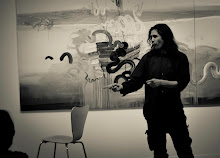An odd paradox lies close to the heart of stand up philosophy. Great philosophy is like great story telling, it is always open to reinterpretation and rethinking. One is never therefore simply a 'tribute act', and does not have the luxury of simply performing a script. On the contrary, to work out how to perform thought, is to be thinking at many levels, and with very many kinds of approaches.
First and foremost every performance must actually work as 'Stand Up'. It must therefore have a hook that will carry the audience along, be it the issue raised, the power of the words, or the intensity of the performance, or the humour of the approach. Every routine has therefore to be carefully thought through in terms of how it is reaching the audience, and making some kind of contact with them. Moreover audience participation is one of the central elements in working out how to make the performance work. One does not want too much of it of course, as stand up philosophy is not children's story telling. But not to have it at all runs counter to what the show is all about, as it reimposes the gap between the thinker and the audience. Getting the audience involved is highly nuanced, its aim is to always make them feel very much a part of the actual unwinding history of philosophy.
Secondly every performance needs to be true to the thinker. The ideas have to reflect what they are saying, and summarise something about them and their work. One needs then to extract the pith of the idea, as one understands it, which is always itself an active thought. And yet exactly how one tackles the original text is complicated by the history of how that work was interpreted and worked out across time. There is no point in just performing Cicero's 'Republic' alone, as much of its power lies in the fact that it is the bedrock of modern democratic constitutions. The strength of the performance therefore, lies in the fact that the audience hears this link, and reflects upon it in the context of the tragedy of Cicero's life. Nor is this ever simply a matter of going one way - for sometimes the history and tradition have greatly distorted how we understand what the thinker would tell us. There is nothing more shocking to most Western audiences than what Marx actually wrote, in all its measured reason, and ironic prophecy, and the game of performing him is therefore to somehow bypass the history that would tell us what to think of him and his work.
In short, one might say stand up philosophy only works if it is a real, albeit experimental, form of thinking. Ideas have to be thought through, performed and so shared, in the consciousness that the very act of sharing, transforms the ideas. To perform an idea or hear a performance, can never be the same as encountering that idea in book (or even in most lecture halls). And yet of course, this is indeed the point; Every idea always exists and actually has a power beyond the book and the school room. Philosophy matters in its capacity to reach beyond its specialists, to reach into people's minds and be reflected in the way they think and react. A movement that philosophy shares with not only most other forms of thought, but also with popular ideas and humour. Perhaps all good stand up revolves around being a link in this process. Stand up's role is to pass on semi-oral snippets - be they jokes or phrases or ideas, that will thereby slip into new contexts, and allow for new reactions, thoughts and remarks. All stand up must be fundamentally generous to the work which it shares. A generosity that I hope stand up philosophy not only shares in, but which transforms the ideas and their understanding, and so makes act of performing thought itself always a thought.


No comments:
Post a Comment